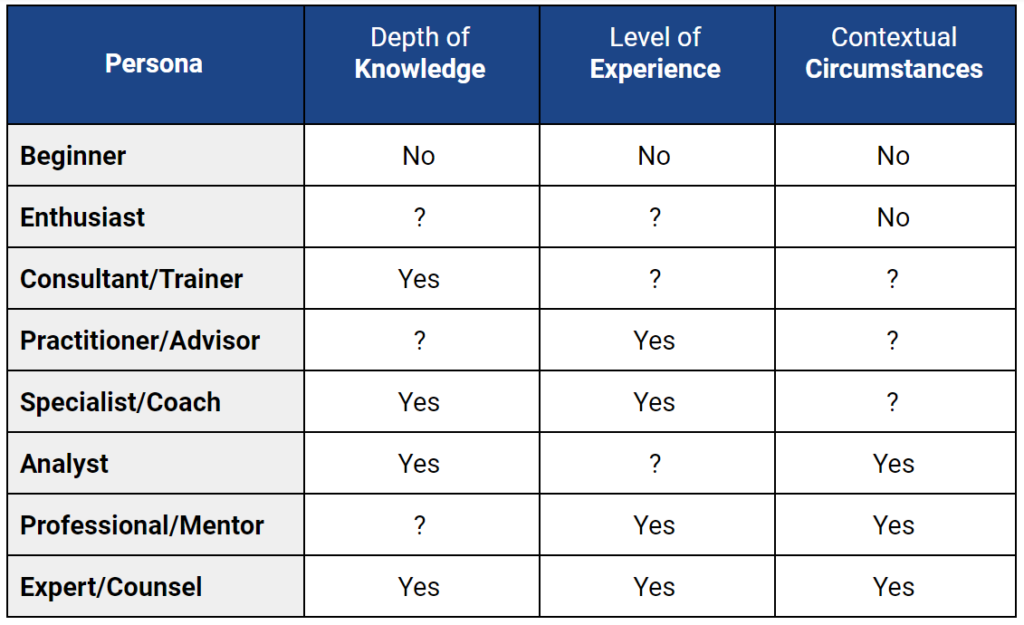TL;DR You know the quality of your Uber driver before you get in their car. But when you look for information online, you are confused by thought leaders and can’t tell the difference between fact and fiction. This article will show you how to differentiate between an expert with real insights, versus a “thought leader” that is sharing opinions, and quite frankly bad sales advice.
Demand for Insight
Sales is undergoing a radical transformation; the revenue generation has shifted from Close to Renew, the Sales Tech Stack has grown exponentially, and a new generation of sales professionals are knocking at the door.
During this transformation, insight on what works and what doesn’t are vital to help salespeople make the right decision.
Unlike other trades, there is no central body in sales where you can get answers to even the most mundane sales question. There is no authoritative voice to help you make an important decision.
Instead, industry knowledge is passed among sales practitioners in the form of blog posts, webinars, and word of mouth at events. Due to the sheer amount of information in this space, many turn to industry thought leaders to help weed through the noise.
What is a Thought Leader? Why Are They Dangerous?
The definition of a thought leader says “someone whose views on a subject are taken to be authoritative and influential.”

Previously such a position was acquired at great cost and earned over a significant deal of time, by only a select few who had made a lifelong commitment to their trade.
Today through nifty use of social media, one can become influential by acquiring a large following almost overnight. Becoming an “authority” is easier than ever before, as thought leaders simply have to curate content, all the while receiving the credits without having to do any of the labor.
This has made it extremely hard to distinguish between the opinion of an enthusiast who has a large following (but just learned about marketing and sales) versus a true expert who has valuable insight gained through hard learned lessons over years, but who has no following.
When reading articles from most thought leaders today, it’s hard to distinguish if the insights provided were obtained first hand or overheard at a conference.
A Question You Must Always Ask Yourself:
Is this an opinion, a fact or a belief?
Insights vs. Opinions

What sets the two apart is that one has a real insight, while the other only an opinion.
- Opinion – Not necessarily based on facts or knowledge.
- Insight – Based on experience and knowledge.
As you can see the difference between an opinion and insight is that insight is based on experience and knowledge!
That’s good news as experience and knowledge are hard to fake.
Note: We still need to ensure that the experience and knowledge applies to the right situations (context).
This allows us to create a definition for a real insight:
- Real Insight [a deep understanding]
- Knowledge [understanding how it works]
- Experience [having done it before]
- Context [understand interrelated conditions]
Depth of Knowledge – Norman Webb a senior research scientist at the University of Wisconsin-Madison defined 4 levels of depth of knowledge widely used across industries:
- DoK 1: Ability to recall or reproduce.
- DoK 2: Ability to apply skills and new concepts.
- DoK 3: Ability to strategize, generalize and connect ideas.
- DoK 4: Extend the thinking, analyze, reason causality, design, and create new approaches.
Level of Experience – To keep it simple I condensed experience to the following levels:
- Novice: Done it once or twice. Has to follow instructions on what to do.
- Intermediate: Done it many times. Only needs instructions when things go awry.
- Advanced: Done it for years/decades. Will do the right thing at the right time instinctively.
Contextual Circumstances – Insights acquired in one market may not apply to another market. The differences in selling to B2B vs. B2C are obvious, but the differences selling to SMB and Enterprise are less obvious.
That of course depends on the definition of SMB and Enterprise; Is it by total employee count, or just knowledge workers, based on revenue, etc.
Understanding the context makes all the difference.
Case-in point: One of Winning By Design’s clients sells to family businesses in the mid-west, where the phone gets picked up 9 out of 10 times. Cold calling is an absolute must! A simple call/voice/email combo will do wonders, whereas there’s no need for a 5 x 12 email sequence.
Yet another client calls on Veterinarians; where cold calling is considered a big no-no, with ramifications that will impact your brand name.
Even worse, cold calling a person in Germany can be downright illegal! The contextual circumstance makes all the difference.
Depth of Insight
The above definition for Real Insights allows us to map personas against the attributes. It shows the difference between a passionate enthusiast and an expert.

Note: I chose not to apply the Depth of Knowledge nor Level of Experience to each category. Keeping it this simple favors the understanding.
So where is the thought leader in this picture? Nowhere and everywhere.
[Tweet “Anyone today can become a “thought leader,” and that is exactly the problem -@IndoJacco”]
But if you are looking for Real Insights, you’re better off listening to a Practitioner, or an Expert.
How To Find Experts (And Avoid Popular Enthusiasts)

We need to lend more credence to those who are actually doing it such as Practitioners, Professionals and Experts – and less to Thought Leaders, Strategists, and Motivational Speakers.
- We need less of – “How to create a Unicorn in 10 days”
- We need more of – “Should I hire a VP of Sales as my first sales hire?”
Here are a few pointers on how to identify those people who have real insights:
Advice #1: Don’t Look For Followers
Look for Engagement; True experts are too busy to build a large following, or write frequent blog posts, or tweet 5-10 times a day. Why? Because they are too busy developing their expertise. However, read the comments on the post.
Advice #2: Don’t Be Trapped By Dogma
In social media we generally subscribe to people we like and enjoy listening to. This tends to give us an opinion of people who “think alike.”
Steve Jobs even called this out in his famed commencement speech at Stanford.
It has never been more true than today! If you rely on social media as your source of information (tweets, blogs, etc.) you are living with the results of other people’s thinking. Realize this.
Advice #3: Learn How To Spot The Bullsh!tter
Find a video of an expert speaking on the topic. It is amazing how much depth you get when you hear and see the person actually saying it aloud.
Better yet if they explain why, how and what on a whiteboard step by step.
A great example of this would be Rand Fishkin’s Whiteboard Friday series via Moz.
Bottom Line: You can spot a bullshitter in a microsecond, regardless if they are an exquisite public speaker. Knowledge and expertise tends to come out under pressure.
Advice #4: Find Out How The Sausage Was Made
With a few simple searches you can learn how an expert developed their expertise. A simple online search will show you where the person worked, articles written, videos speaking, and presentations.
The evidence presented will help you identify the so-called Account Based Marketing “expert” who was a Social Selling “expert” just a few months ago.
Case-in point: In May, I was doing a workshop for Endeavor (a global entrepreneurship movement).
I started the session by asking:
“What do you want to know about me?”
The attendees were a bit dazed and confused by my question. I explained that it is critical for them to determine the context of my experience.
Swiftly attendees started to ask; “Have you helped companies in the Middle East”, “… in Latin America”, and “.. in B2C or just B2B.”
“The point is to not blindly trust the insights the expert is giving you, but learn about the context of the insights, and compare this to your own world.”
Advice #5: Always Be Curious
When you watch a video and/or read a post, do not hesitate to ask the author for clarification via the comments section. This allows the author to help future readers with your comment(s). The response by the author demonstrates real insights.
Advice #6: Question The Data
Data in sales is still in its infancy. We lack standardization of terms, agreement on the comparable metrics, and overall data architecture to name a few.
As a result, data can be tweaked to validate whatever the story needs. Think of the way we measure sales metrics such as; win rate, sales cycle, and annual contract value for example.
These three basic metrics still differ for almost each and every company. So don’t trust insight because if there was some data – you must question it.
In Closing
When you need to make an important decision that benefits from authoritative and trustworthy insight, talk to someone who:
a) Has the scars to prove that they actually “have done it.”
b) Demonstrates proven knowledge on the situation
c) Understands the context of your particular situation. You will find these people to be Experts, Professionals, and Practitioners.
Don’t fall for the hype. Sure, having thousands of Twitter followers may look cool, but the result of blindly following opinions because they are popular may cause detrimental ramifications to your business.







